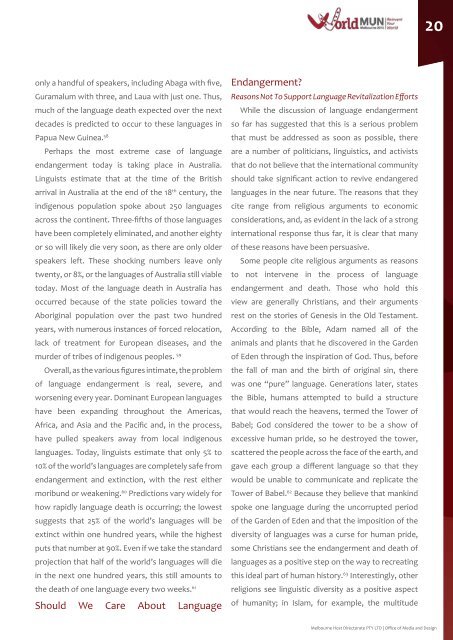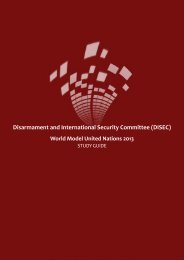Social, Humanitarian and Cultural Committee (SOCHUM)
Social, Humanitarian and Cultural Committee (SOCHUM)
Social, Humanitarian and Cultural Committee (SOCHUM)
You also want an ePaper? Increase the reach of your titles
YUMPU automatically turns print PDFs into web optimized ePapers that Google loves.
only a h<strong>and</strong>ful of speakers, including Abaga with five,<br />
Guramalum with three, <strong>and</strong> Laua with just one. Thus,<br />
much of the language death expected over the next<br />
decades is predicted to occur to these languages in<br />
Papua New Guinea. 58<br />
Perhaps the most extreme case of language<br />
endangerment today is taking place in Australia.<br />
Linguists estimate that at the time of the British<br />
arrival in Australia at the end of the 18th century, the<br />
indigenous population spoke about 250 languages<br />
across the continent. Three-fifths of those languages<br />
have been completely eliminated, <strong>and</strong> another eighty<br />
or so will likely die very soon, as there are only older<br />
speakers left. These shocking numbers leave only<br />
twenty, or 8%, or the languages of Australia still viable<br />
today. Most of the language death in Australia has<br />
occurred because of the state policies toward the<br />
Aboriginal population over the past two hundred<br />
years, with numerous instances of forced relocation,<br />
lack of treatment for European diseases, <strong>and</strong> the<br />
murder of tribes of indigenous peoples. 59<br />
Overall, as the various figures intimate, the problem<br />
of language endangerment is real, severe, <strong>and</strong><br />
worsening every year. Dominant European languages<br />
have been exp<strong>and</strong>ing throughout the Americas,<br />
Africa, <strong>and</strong> Asia <strong>and</strong> the Pacific <strong>and</strong>, in the process,<br />
have pulled speakers away from local indigenous<br />
languages. Today, linguists estimate that only 5% to<br />
10% of the world’s languages are completely safe from<br />
endangerment <strong>and</strong> extinction, with the rest either<br />
moribund or weakening. 60 Predictions vary widely for<br />
how rapidly language death is occurring; the lowest<br />
suggests that 25% of the world’s languages will be<br />
extinct within one hundred years, while the highest<br />
puts that number at 90%. Even if we take the st<strong>and</strong>ard<br />
projection that half of the world’s languages will die<br />
in the next one hundred years, this still amounts to<br />
the death of one language every two weeks. 61<br />
Should We Care About Language<br />
endangerment?<br />
Reasons Not To Support Language Revitalization Efforts<br />
While the discussion of language endangerment<br />
so far has suggested that this is a serious problem<br />
that must be addressed as soon as possible, there<br />
are a number of politicians, linguistics, <strong>and</strong> activists<br />
that do not believe that the international community<br />
should take significant action to revive endangered<br />
languages in the near future. the reasons that they<br />
cite range from religious arguments to economic<br />
considerations, <strong>and</strong>, as evident in the lack of a strong<br />
international response thus far, it is clear that many<br />
of these reasons have been persuasive.<br />
Some people cite religious arguments as reasons<br />
to not intervene in the process of language<br />
endangerment <strong>and</strong> death. those who hold this<br />
view are generally Christians, <strong>and</strong> their arguments<br />
rest on the stories of Genesis in the Old testament.<br />
According to the Bible, Adam named all of the<br />
animals <strong>and</strong> plants that he discovered in the Garden<br />
of Eden through the inspiration of God. Thus, before<br />
the fall of man <strong>and</strong> the birth of original sin, there<br />
was one “pure” language. Generations later, states<br />
the Bible, humans attempted to build a structure<br />
that would reach the heavens, termed the Tower of<br />
Babel; God considered the tower to be a show of<br />
excessive human pride, so he destroyed the tower,<br />
scattered the people across the face of the earth, <strong>and</strong><br />
gave each group a different language so that they<br />
would be unable to communicate <strong>and</strong> replicate the<br />
Tower of Babel. 62 Because they believe that mankind<br />
spoke one language during the uncorrupted period<br />
of the Garden of eden <strong>and</strong> that the imposition of the<br />
diversity of languages was a curse for human pride,<br />
some Christians see the endangerment <strong>and</strong> death of<br />
languages as a positive step on the way to recreating<br />
this ideal part of human history. 63 interestingly, other<br />
religions see linguistic diversity as a positive aspect<br />
of humanity; in Islam, for example, the multitude<br />
20<br />
Melbourne Host Directorate PTY LTD | Office of Media <strong>and</strong> Design

















